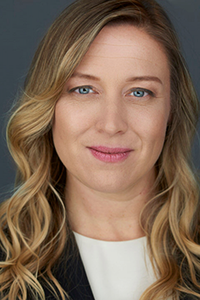
Dr. Rachel Chambers is a Postdoctoral Research Associate who focuses her time at UConn on researching corporate accountability mechanisms and teaching Corporate Social Impact and Responsibility (BLAW/BADM/HRTS 3252). Dr. Chambers will join the faculty of the School of Business Marketing Department as an Assistant Professor in Business Law this fall. Dr. Chambers’ role provides her with the opportunity to introduce her research findings into the classroom and allows for lively discussions on corporate sustainability, social responsibility, and accountability. Only a few courses around the country teach undergraduates these topics; this is a special opportunity to uniquely learn and develop your educational toolkit. BLAW 3252 is offered to both Human Rights students and Business students, which creates a lively environment where students can learn from each other’s separate educational experiences and explore the knowledge together.
For marketing students, there is a growing need for individuals focused on social justice and environmentalism within large corporations. The pandemic has shed a light on the repercussions of poor corporate decisions; whether that be supply chain issues impacting the lives of foreign laborers in developing countries or the unethical health risks employees are facing in the U.S. There is substantial ‘sustainability noise,’ Dr. Chambers shares, where companies are sending out messages about their good practices, but there is little tangible action behind the claims made in advertisements or public releases. Marketers with a passion for human and environmental rights can influence an era of change for many large companies who fail to substantiate such claims. For consumers who wish to make purchasing decisions based on the ethical behavior of companies, it can be difficult to find readily understandable information on the actions of companies and effectively make decisions that reflect a consumer’s values. This is one conversation that is explored in Dr. Chambers’ course, as students search for solutions on how to channel the good intentions of companies into actionable results.
Historically, Corporate Social Responsibility Officers may have been located within the Marketing or Communications departments within a company. Now, Dr. Chambers is observing a shift in this role as companies create bespoke sustainability departments and involve other parts of the business in this work including the General Counsel’s office. Marketing is still very much involved, though, in a company’s messaging about sustainability, environmentalism, and social justice. Gaining exposure to these topics and developing this skill will be a great benefit in today’s corporate world and can create new areas of opportunity in careers after graduation. One of Dr. Chambers’ motivators is that by educating students on corporate responsibility, students will gain a toolkit of information to make knowledgeable decisions about how to work ethically, identify the companies they wish to work for, and learn how to be a more informed consumer. If you are interested in learning more or are interested in pursuing career opportunities in this area, consider registering for Dr. Chambers course, Corporate Social Impact and Responsibility, this fall.
Read more about Dr. Chamber’s experience and insight on her course, BLAW 3252, during this interview with the School of Business.